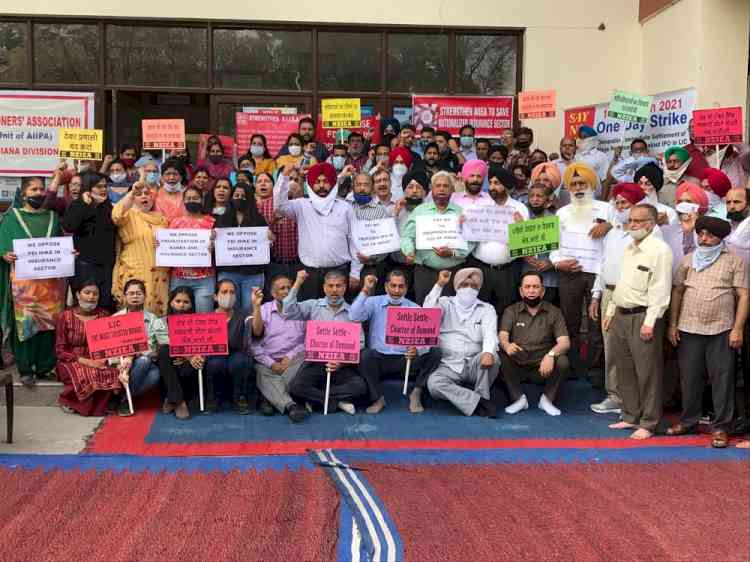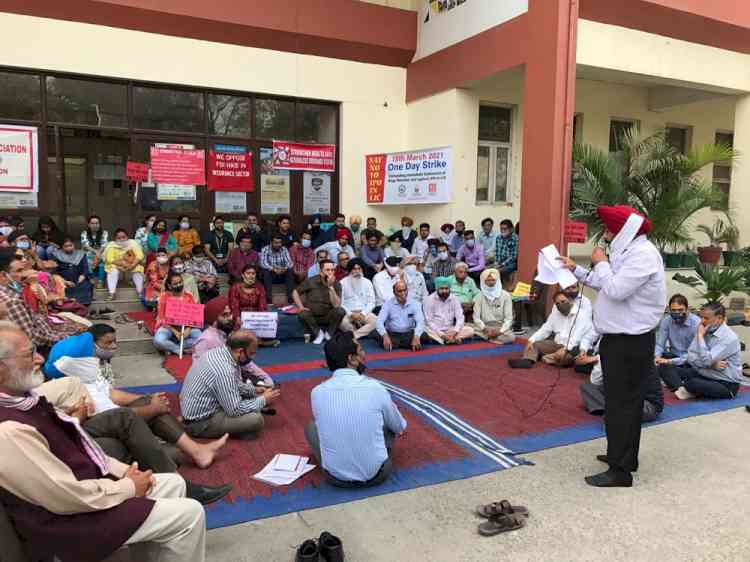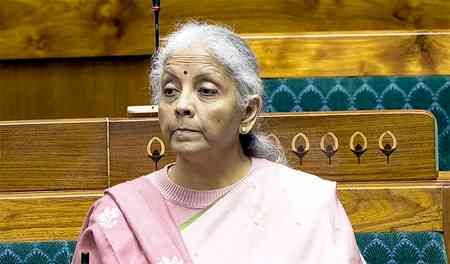LIC employees observed strike on 1-day nationwide call for strike
Protest staged in front of the office of LIC, Divisional Office, Urban Estate, Phase-I, Dugri, Ludhiana

Ludhiana: The employees and officers of LIC went on one day nationwide strike today to protest against the decision of the government to list LIC in the stock markets through an IPO, increase FDI limits in the sector from 49% to 74%.
They staged protest in front of the office of LIC, Divisional Office, Urban Estate, Phase-I, Dugri here. They were holding placards of their demands in their hands and shouting slogans such as “We oppose FDI hike in insurance sector”, We oppose privatisation of banks and insurance sector”, “Say no to proposed IPO in LIC of India” and “Settle Settle charter of demand of NZIEA”.
Protestors were addressed among others by Amarjit Singh Divisional Secretary, NZIEA; PP Singh, President; Sanjiv Sood, Divisional Secrteary, Class -I Officers Association; NS Kala, Divisional Secretary, LIC Pensioners Association.
The strike was called by All India Insurance Employees’ Association (AIIEA), Federation of LIC Class-1 Officers’ Association, National Federation of Insurance Field workers of India (NFIFWI). All the Associations are opposed the proposals of the government as these are not in the interest of the insurance industry, the Indian economy and the people, said the speakers. Adding, they said the LIC IPO will severely impact the economy and vulnerable sections of the Indian people. The objectives of nationalisation will recede into background and LIC will have to concentrate on delivering increasing profits to the shareholders. The LIC like the private companies have to target the big policies which bring greater profits. In the process the small size policies which the poor, vulnerable and lower middle classes purchase will no more be attractive. The social objective of providing insurance cover to the weaker sections will receive a set-back. The aim to expand insurance in the unprofitable rural areas too will suffer. Therefore, disturbing the character of LIC will harm the interests of the national economy and the poorer sections of the Indian population.
Further, the speakers said that the government has proposed to increase FDI in insurance sector from 49 to 74 per cent and has decided to allow even foreign ownership in insurance company.
The argument for FDI hike is that insurance is a capital intensive business. The development and expansion of insurance requires significant amount of capital, which the Indian partners are not capable of doing. This is not true. All the big corporate houses of India have entered the insurance business and capital has never been an issue with them. Most of these business houses have been investing heavily outside the country for expansion of their interests. Therefore, it is not possible to accept that they lack resources for expansion. Some of them are also listed and have access to raise capital through the markets in India.
The second argument is that insurance in India still remains under penetrated. Penetration is seen as premiums collected in relation to the GDP. In a country which has a low per capita income and people lack adequate resources to save, looking at the insurance market from this angle is not entirely right. It is estimated that nearly 40 crore Indians are insured both through individual assurances and Group insurance. It is estimated that the insurable population (Persons who can be insured) in India is around 60 crore. Therefore the numbers of persons covered are significant. This number can increase depending upon the rising levels of income and savings.
Insurance, especially life insurance, mobilises small savings of the people and converts them into capital for long term investments in social and infrastructure projects. It is therefore imprudent to allow foreign capital greater access to and control over domestic savings. It is important that in a developing economy like ours, the state exercises greater control over domestic savings. Allowing foreign capital greater control over domestic savings would surely harm the nation. In a country which has scarcity of capital, it is imprudent to allow the foreign capital to control the household savings. The experience worldwide has proved that foreign capital can never be a substitute for capital formation through domestic savings.
They said the AIIEA has been mobilizing public opinion against the decisions of the government. It has urged the government to reconsider these decisions in national interests. The AIIEA has met over 450 MPs to inform them of the inherent dangers to the national economy. The AIIEA requests the people of India to extend solidarity with the LIC employees strike on 18th March 2021 and support the campaign against LIC IPO, FDI hike and privatization of Banks and general insurance company.



 cityairnews
cityairnews 










